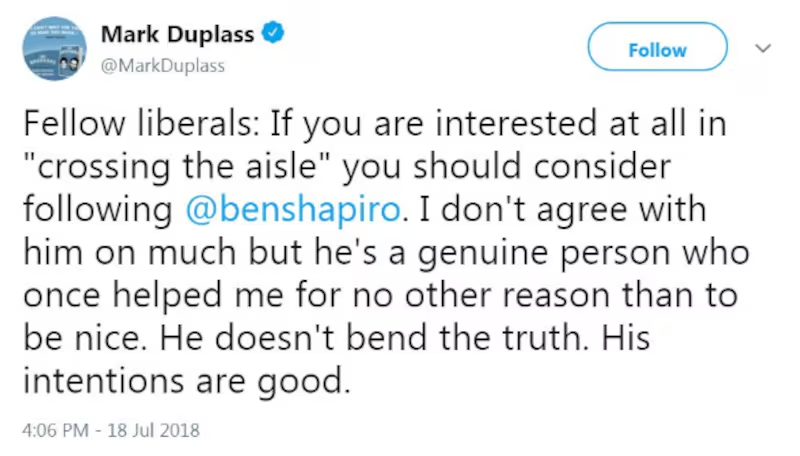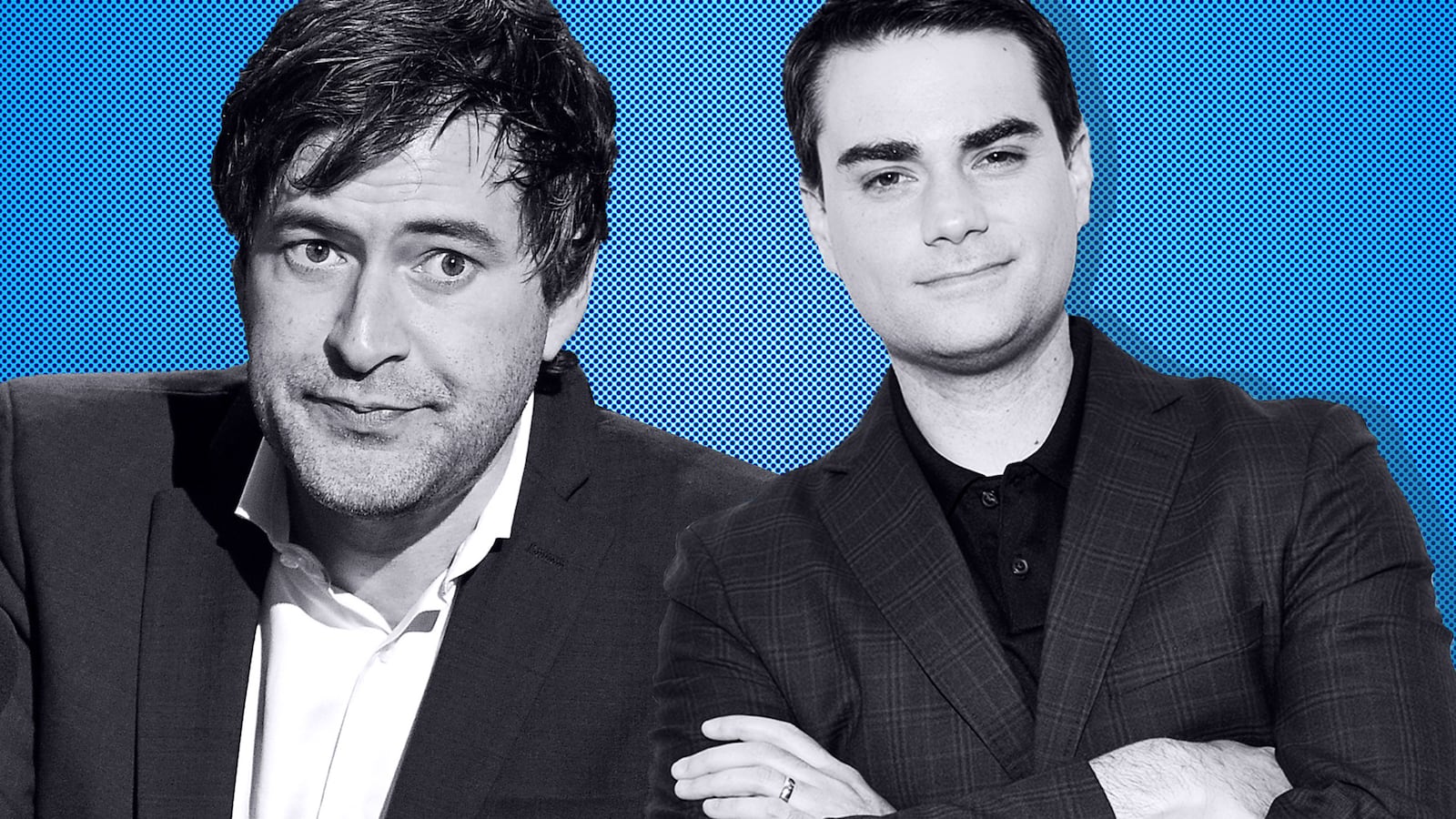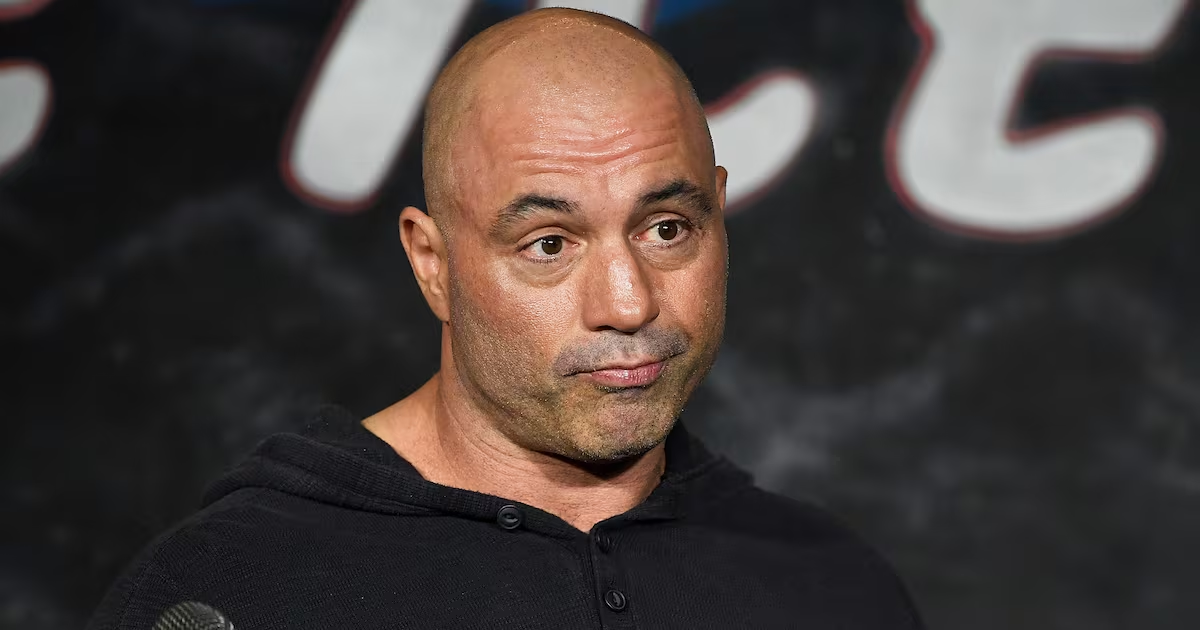On Wednesday, professed Hollywood nice guy Mark Duplass found himself at the center of a social media pile on after tweeting an endorsement of Ben Shapiro, the former Breitbart editor and author of alarmist dreck like Porn Generation: How Social Liberalism Is Corrupting Our Future. Addressing his “fellow liberals,” Duplass’ tweet recommended Shapiro as one to follow for anyone “interested at all in ‘crossing the aisle.’”
The misguided tweet continued, “I don’t agree with him on much, but he’s a genuine person who once helped me for no other reason than to be nice. He doesn’t bend the truth. His intentions are good.”
Though it wasn’t immediately clear what “nice” thing Shapiro did to invite this rosy outpouring of bipartisan admiration, Duplass’ liberal followers were quick to point out the issues with his suggestion—namely, Shapiro’s long history of racism, xenophobia and intolerance.

Duplass has since deleted the tweet and issued a statement of apology, calling the original remark “a disaster on many levels” and acknowledging, “sometimes I move too quickly when I get excited, or fail to do enough research, or I don’t communicate myself clearly. I’m really sorry. I now understand that I need to be more diligent and careful.”
Still, it’s impossible to take Duplass’ tweet as a one-off flub. The Shapiro suggestion is just the latest in a series of Duplass efforts to bridge the gap between the left and right, including guest visits on podcasts with conservative commentators Glenn Beck and Steven Crowder, as well as a visit to The Rubin Report, the talk show from alt-right cheerleader Dave Rubin
Duplass’ motive in reaching across the political aisle, as he defined in a March Huffington Post op-ed, is to find some common ground with those on the right, and then move forward from there. “If we start with what we agree on, instead of arguing about what we don’t agree on, we might be able to grow that seed from the ground up into something big,” he wrote.
Presumably, it was this approach that inspired Duplass to tweet at Crowder in March, “would genuinely like an education if that's your intention. if u only want to make fun of me like u do on prank calls, no thx ok?”
Duplass joined Crowder on his podcast later that month, discussing topics ranging from abortion, to patriarchy, to Obama’s character. While standing his ground on most issues, Duplass did acknowledge that vitriol was coming from both sides. “A lot of the incendiary things you’re hearing from the left is fear-based, and there are a lot of people who are afraid of this regime. And I think they have a right to be afraid,” he said. Declaring the conversation a success, he added before leaving, “I’m going to recommend my friends to come here.”
On The Rubin Report in April, Duplass reflected on his visit to Crowder’s show, which he said was inspired by a desire “to ferret out some possible connections and to learn.” After some prodding from Rubin about Crowder’s motives, Duplass acknowledged, “so I might discover three or four months down the line that I did some form of enabling, or something, and I’m willing to admit, there may be a problem. But I’m not seeing it right now, and my instinct is telling me: connect, and if the connection does some ancillary good, this is a good thing.”
The actor-filmmaker’s initiative speaks to a larger tendency of impressionable liberals to lend an ear—and by extension, lend credence—to a certain sect of conservatives, particularly professed #NeverTrumpers like Ben Shapiro. Bill Maher has been guilty of this of late, buddying up to problematic guests like Milo Yiannopoulos, Breitbart editor-in-chief Alex Marlow, gun rights activist Colion Noir and recently, none other than Shapiro himself.
Shapiro was early to declare himself part of the #NeverTrump campaign in March 2016, pledging on The Daily Wire: “I stand with conservatism. Donald Trump stands against it.” In solidarity with fellow staffer Michelle Fields, who’d accused then Trump campaign manager Corey Lewandowski of battery, he resigned from Breitbart just over a week later, saying in a statement, “In my opinion, Steve Bannon is a bully, and has sold out Andrew’s mission in order to back another bully, Donald Trump.” He also accused the far-right outlet of being “Trump Pravda.”
In the unofficial taxonomy of Republican pundits, voices like Shapiro get rewarded. But coming out against Trump doesn’t automatically make you a right-wing saint, and it certainly shouldn’t lend credibility to otherwise dubious views and opinions.
In Shapiro’s case, there’s a long history of prejudice and hypocrisy from which you can cite. As reported by ThinkProgress, Shapiro has been known to issue bigoted and contradictory statements, such as his 2011 comparison of Obama supporters to Nazis, his condemnation of fake news while disseminating misleading videos, his vile transphobia, that racist Columbus Day video, or his 2016 celebration of the death of Trayvon Martin, asserting that the teenager would still be alive had he not “taken a man’s head and beaten it on the pavement before being shot.”
Duplass urging his 400,000-plus to give Shapiro a chance seems like a classic case of a guy who simply didn’t do his homework. It boosts Shapiro’s profile in the same way that getting chummy with Crowder—a guy who associates the LGBT community with pedophilia and once sat on a college campus with a sign that read “Male Privilege is a Myth: Change My Mind”—is a dangerous route to normalizing toxic behavior.
In response to Duplass’ apology, Shapiro responded on Thursday: “So in 24 hours I apparently went from being a person with good intentions to a racist sexist bigot. Twitter toxifies any attempt to cross the aisle. There’s no conservative Mark could have recommended who wouldn’t receive the same blowback.”
Glenn Beck, a gross political opportunist, also decided to offer his two cents, tweeting of Duplass’ apology, “it is sad that @MarkDuplass was swayed by the mob this morning.”
Maybe Shapiro’s right, and the blowback would have come from any such endorsement from Duplass. But if you’re gullible enough to fall under the spell of outspoken bigots, don’t expect it to slip by unnoticed.





